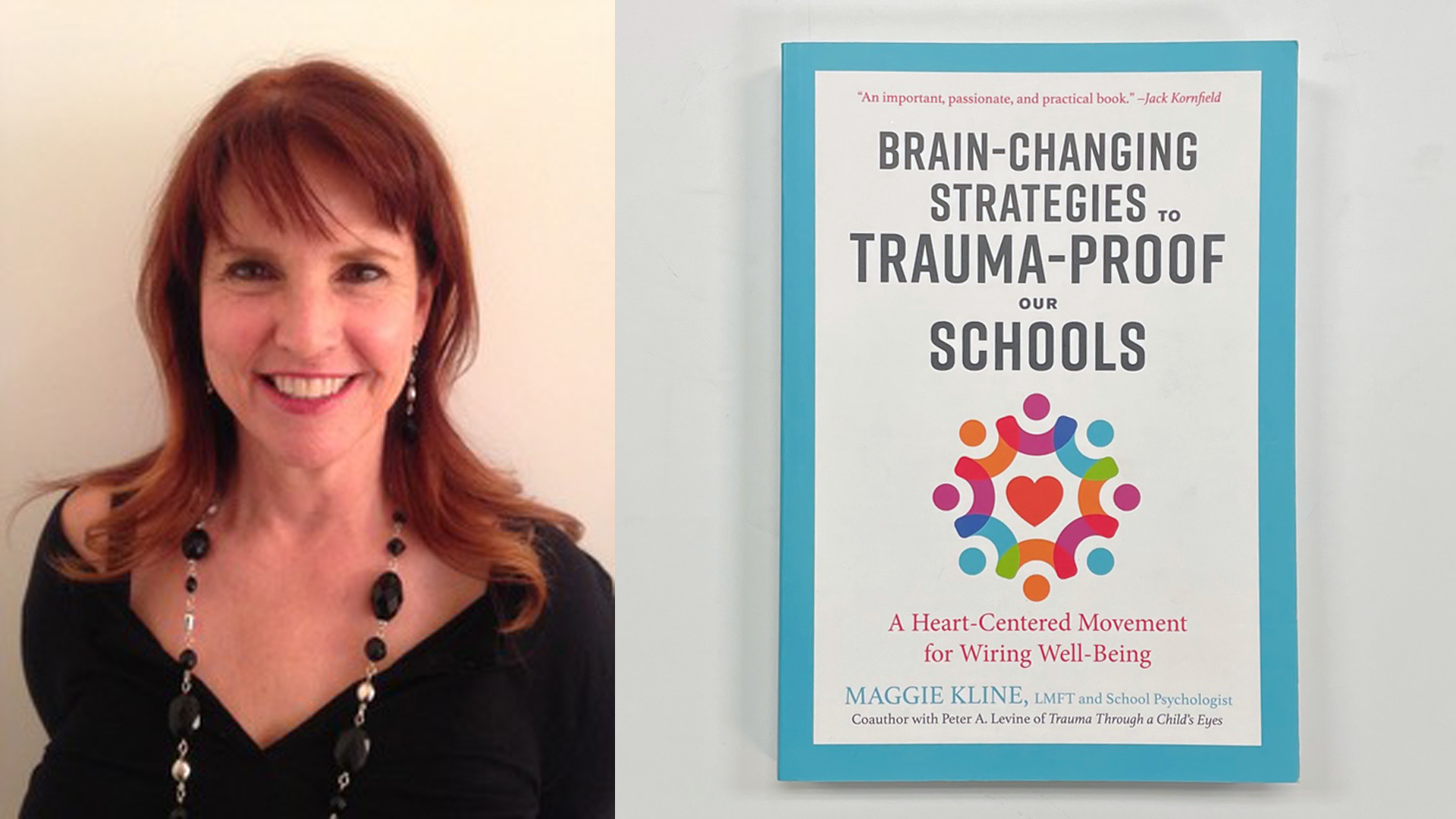Wednesday, Mar 23, 2022
The third book by Maggie Kline ’69 is ‘Brain-Changing Strategies To Trauma-Proof Our Schools’
by Adam Grybowski
A growing number of school teachers are reporting disillusionment with the profession. Struggling with the effects of the pandemic and ongoing staff shortages, 55% of educators nationwide say they are ready to retire earlier than expected, according to survey results released in February by the National Education Association.
“Teachers were stressed out before the pandemic, which only added another layer to their burnout,” says Maggie Kline ’69, a retired school psychologist who has been a somatic marriage, family and child psychotherapist for more than 35 years.
Kline is a longtime advocate of healing the effects of trauma and stress among teachers, students and parents. Through three books and experiential seminars in more than 50 cities on five continents, she has been sharing strategies to create resiliency for decades — lessons that are as cogent today as ever.
On April 5, Kline will present a virtual talk, “Brain-Changing Strategies to Trauma-Proof Our Schools and Communities,” for the Rider community. She invites alumni, as well as Rider students who are interested in becoming trauma-responsive and wish to learn more about neuroplasticity to transform stressful thoughts, symptoms and behaviors.
She presented a similar talk in 2020 at a Harvard/MIT/Johns Hopkins joint virtual conference on the occasion of her latest book release by North Atlantic Books. Brain-Changing Strategies to Trauma-Proof Our Schools is chock full of tools, activities and inspiration to support healthy social and emotional development. Its practices are informed by Somatic Experiencing trauma healing, neuroscience, attachment research and embodied mindfulness.
“If we want to have a less violent and mentally stable society where people care about each other and can see different points of views, we have to incorporate activities that develop the circuitry in the brain for empathy and kindness and transform traumatic defensive responses," Kline says. "Schools adopting certain practices from the book can prevent the bully and victim mentality.”
Kline majored in distributive education at Rider and later added a master's degree in counseling psychology from California State University Long Beach. Before embarking on her dual careers in school psychology and somatic family therapy, she was a high school teacher in Alaska and an elementary teacher in Long Beach Unified School District. Witnessing the lives of inner-city children inspired her desire to help them in a meaningful way. The strategies she writes about in her latest book are designed to heal the wounds such students suffer as children and teenagers and build their capacity for resilience and self-regulation that will ultimately support their academic success.

To educate our children we must educate their hearts as well as their minds.”
Kline facilitates the transformation of ongoing, lived repercussions of trauma in the brain and body. "Trauma is often an implicit memory stored in the survival parts of the brain and the body that cause symptoms like anxiety or depression and/or provoke behaviors stored as a program of 'unfinished business' triggering the flight, fight or freeze response," she says.
Her emphasis on the physiological aspects of trauma have been heavily influenced by her mentor, Dr. Peter A. Levine, who developed the Somatic Experiencing method, a body-oriented therapeutic model that prevents long-terms symptoms and heals trauma. Together, they are the co-authors of Trauma Through a Child's Eyes and Trauma-Proofing Your Kids.
Kline says the beginning level of Somatic Experiencing training developed by Levine shares similarities with embodied meditation, which brought her and Jack Kornfield into the same orbit. Well-known for being one of the most influential teachers to introduce Buddhist mindfulness practice to the Western world, Kornfield called Kline's new book "important, passionate and practical."
“To educate our children we must educate their hearts as well as their minds," he says. "This important, passionate, and practical book shows us powerful and critical tools for healing trauma and creating an education of emotional well-being and empowerment.”
Kline says embodied mindfulness teaches both adults and children to pause long enough to become aware of what’s happening in their physical, sensing body: "Learning what to do with both pleasant and unpleasant sensations is key to breaking automatic habits of reactivity."
Kline's vision is to start a movement to see such practice widely adopted into school curriculums. “I know the pandemic and social media have exacerbated existing problems, but a lot of what is happening is caused by people who have suffered from their trauma, who hold so much hatred inside,” she says. “You are never going to be able to empathize and feel resilience and calm yourself down if your nervous system is always ready for a fight or to flee or to shut down.”

